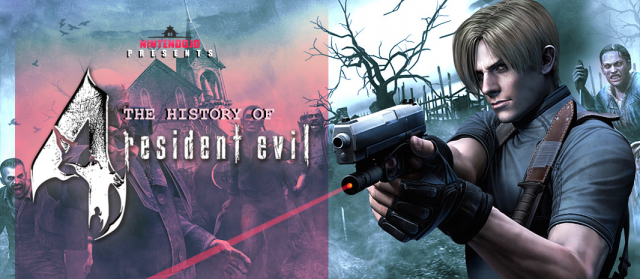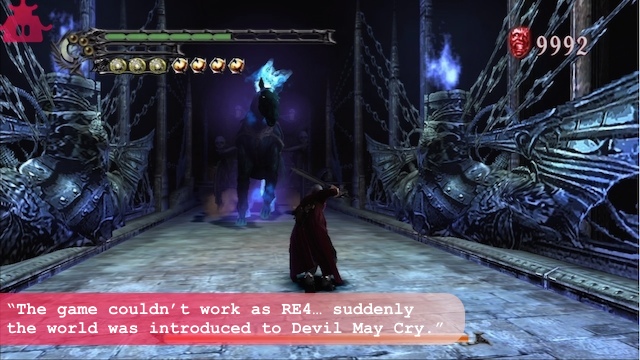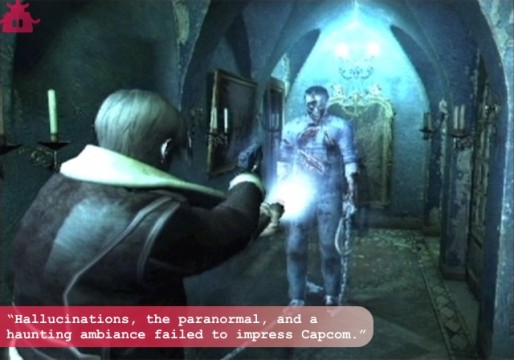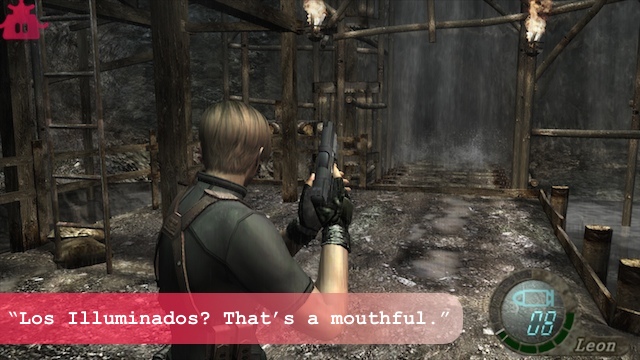
It’s interesting that such a beloved game as Resident Evil 4 should have as chaotic a development history as it does. RE4 as it’s known today is the end result of at least four different builds over a six year period. The culmination of Capcom’s tumultuous efforts remains one of its greatest achievements, as RE4 is widely considered to be a landmark video game for its advances in play control, narrative, and graphics.
When development of RE4 began in 1999, series director Shinji Mikami had handed over control of the series to fellow Capcom teammate Hideki Kamiya. At the time, Resident Evil was arguably Capcom’s biggest and most successful franchise, so expectations were high for the impending fourth sequel, which was intended to launch on Sony’s PlayStation 2. Management’s orders for the development team were as simple as they were imposing; RE4 needed to be cooler and edgier than any game that had ever come before it. Kamiya and company set out to deliver exactly that, when suddenly they hit a snag.
The problem with Kamiya’s RE4 was that it became too cool and edgy for its own good, and thus was certain to never be accepted as a proper installment in the series. The game was packed with action and skewed heavily away from the survival horror elements that put Resident Evil on the map. Kamiya knew, however, that even though the tile couldn’t work as part of the Resident Evil series, it was good enough to be its own thing. A nip, tuck, and rebranding later, and suddenly the world was introduced to the half-demon, half-human warrior Dante and his third-person action game Devil May Cry (itself a precursor to Kamiya’s eventual work on Baynetta). Not bad for a failed game build!

Birthing a new franchise was an unexpected boon, for sure, but Capcom still had to produce a proper sequel to Resident Evil 3. At that point it was 2002 and many changes were coming to RE4. Rather than continue as a PS2 project, RE4 was now (along with the remake of the first Resident Evil and Resident Evil 0) a GameCube exclusive and being helmed by a different director, Hiroshi Shibata. His team developed what some refer to as the “fog” version of RE4, which featured Leon S. Kennedy infiltrating Umbrella’s secret headquarters using a mysterious power in his hand to survive. Certain elements of the game became cemented at this time, particularly the use of Leon as the main protagonist. Shibata’s take was certainly visually impressive, but despite being fairly deep into development it lacked the spark needed to be what Capcom envisioned and was ultimately scrapped.
Another build, another restart, as 2003 brought with it more tweaks to RE4’s development. The setting was altered again, this time placing Leon in the eerie halls of an abandoned house, plagued with spirits and otherworldly enemies to fend off. An iconic aspect of this particular build was a ghostly hook-handed man who chased Leon through the environment. While progress seemed to be being made on the title, this version of RE4 was also eventually deemed by Capcom’s executives to be deficient of that special something, that “it” factor that a Resident Evil game needed to have. Hallucinations, the paranormal, and a haunting ambiance failed to impress Capcom, and rising frustrations from the bosses were about to yield the biggest shakeup yet.
Crunch time had come to RE4, with Mikami reinstated as director for the game as an emergency measure by management. For Mikami, it was a bittersweet return to the director’s chair, as Capcom wanted results– or else. There would be no more restarts once Mikami took over, as management wanted the game both finished and successful or it would be the last hurrah for Resident Evil. Mikami, perhaps in an effort to match the zeal of his superiors, shocked everyone when he dictated RE4 was to become an action horror game.

Mikami’s first step in realizing this new direction was an overhaul of the third-person camera system for movement and combat that had been implemented in earlier prototypes of the game. Mikami had actually intended to utilize a control setup very similar to RE4’s for the first Resident Evil game, but tech limitations on the original PlayStation prevented that from ever happening. With the power of GameCube, though, Mikami was able to remove the infamous, stilted “tank” controls of the first three games. The added muscle of Nintendo’s console also freed Mikami to fully-render the setting of the game. Previous Resident Evils (with the exception of Dreamcast’s Code: Veronica) had all featured static, pre-rendered backdrops. While certainly impressive in their own right, the pre-rendered imagery was unnecessary on GameCube, and creating a fully 3D-environment opened up new design possibilities to the team.
As if implementing the fresh tone and controls for RE4 weren’t enough of a departure, Mikami would take things a step further by replacing zombies with the new “Ganado” enemies. To Mikami, the new third-person shooting elements meant that the traditional, shambling hordes of the dead weren’t going to work as a viable threat any longer; he had visions of intense thrills and action, so the enemies had to change to match. He wanted to challenge players with a smarter breed of foes, ones who would move more quickly and deliberately in their attempts to kill Leon. Combat was also amplified with quick-time events, or timed, precision button prompts that allowed for more elaborate fight sequences. Some games have shamelessly spammed the use of quick time events in the years since, but for RE4 they were refreshing and different. After six years of development, RE4 was finally coming together, but Mikami had no idea just how big of a hit he had on his hands.
When RE4 finally released to the public in 2005, fans weren’t quite sure what to expect of the title. Hype had built to a fever pitch and no one knew if Mikami’s new take would mesh with their memories of PlayStation’s Resident Evil trilogy. It didn’t take long, though, for players across the world to fall in love with this new direction. The controls were exceedingly sharp, allowing for more precision than anything before it. The graphics alone were stunning, but the brilliant character and monster designs made them truly shine. Leon was intentionally made a more appealing leading man than he was in Resident Evil 2, endearing the character to fans and helping make the transition a bit easier for holdouts.

RE4 isn’t without its detractors, of course. Some complain that the heart of Resident Evil was lost by foregoing tension and dread for adrenaline and excitement. There’s no denying that RE4 empowered the player more than ever with its generous ammo and health drops. Gone were the days of clinging to a clip of ammunition for the most dire of circumstances, and with them went the sense of fear and helplessness that was so instrumental to Resident Evil’s initial success. While there are many who can appreciate why some fans might have felt betrayed seeing Resident Evil stray so far from what had come before, there’s no denying that RE4 struck the best balance between action and survival horror that all subsequent sequels have struggled to recreate.
The strides that the development team made with the game’s play mechanics revolutionized third-person shooters; the ramifications of this game are still felt in titles being released today. Perhaps most importantly to fans who loved the title, RE4 was still as scary to them as it was thrilling, and remains the perfect evolution of the series. It also told a story in a cinematic, bold style that embraced some of the campiness of the original trio of games while still pushing forward with a more sophisticated execution. Resident Evil might be currently floundering in the eyes of some, but the continued reverence and adulation for RE4 are proof that the franchise can still be as fun and relevant today as it was when it launched almost twenty years ago– Capcom just has to reclaim that certain something that it discovered for this installment.
Please enjoy these other gaming history features:




 ShareThis
ShareThis






I have Resident Evil Origins HD pre-ordered for Playstation 4 and January 19th can’t come soon enough. Tank controls and illogical puzzles? Yes please. Actual tension and scarce ammo? Uh-huh. Survival Horror? The very definition.
To me Resident Evil peaked as a true survival horror series with Code Veronica on Dreamcast.
RE4 was the beginning of the end (a slow death including RE5 and RE6…. shudders.) Count me as one of the “detractors”.
Sure RE4 is a solid game and its changes were pioneering and even necessary for the health of the franchise, but it is exactly what Mikami intended: an “action horror game” rather than “survival horror.”
To me, RE4 will always be the game that marked when the series became less scary and more of an action game (to join the hundreds of other action games on the market.)
I wish there was a consistent and reliable source of great horror games and the Resident Evil series took itself out of that category starting with RE4. PS4’s “Until Dawn” is the best thing going right now in terms of scares and tension.
RE4 was good, but I think it kind of topped out with that one. I hated the awful Wii version, so got rid of it and kept the Gamecube one. I haven’t played any Resident Evil past #4 until I got Revelations, and so far it’s pretty good. I bought both downloadable versions(Wii U & 3DS)when they were on sale, it was a good purchase. Even picked up Revelations 2 for the X1 but won’t play it until I finish the first one. I heard good things about Until Dawn so will keep that on my radar as well. Has anyone tried The Evil Within? I know it’s from the same creator but haven’t felt compelled to buy it yet.
You all are some haters. I think this game is easily in my personal top fifteen, maybe even top ten games of all time =P
Lol nice!
Ha ha Robert. Well, it is in my top 6 Resident Evil games. :)
But seriously, I’m glad you (and many others) enjoy it. I was only stating my personal opinion and I can’t deny Resident Evil 4’s enduring popularity and “classic” status.
Nice write-up by they way. Enjoyed it as always.
Thanks, OG!